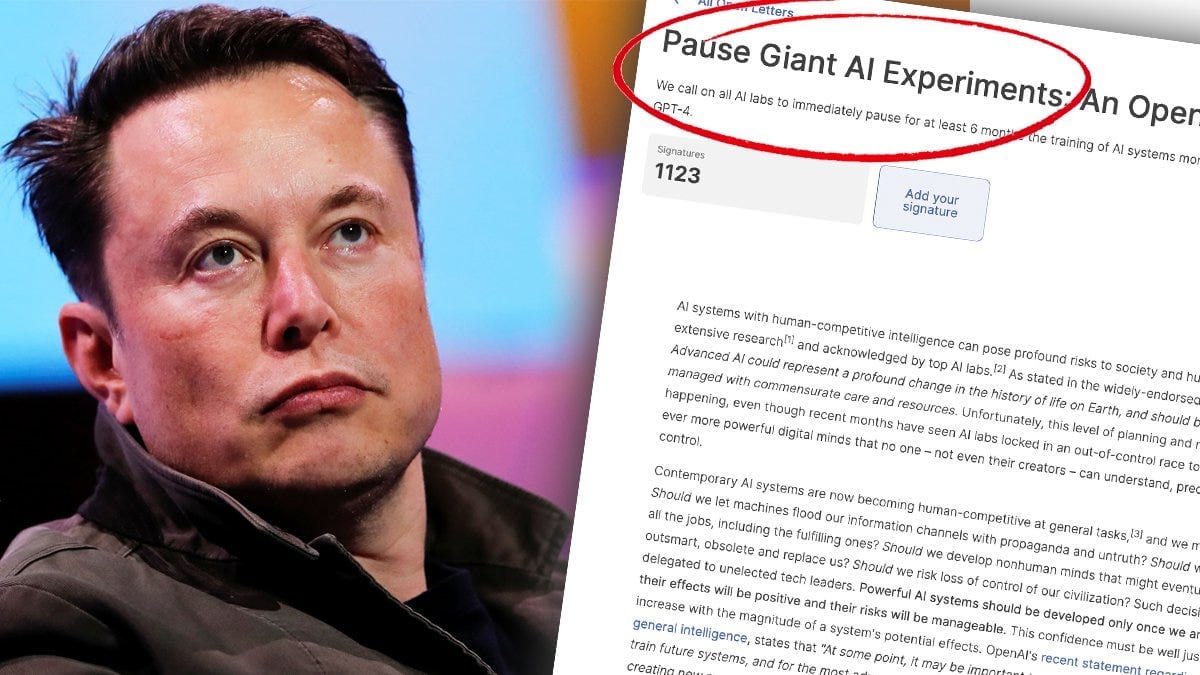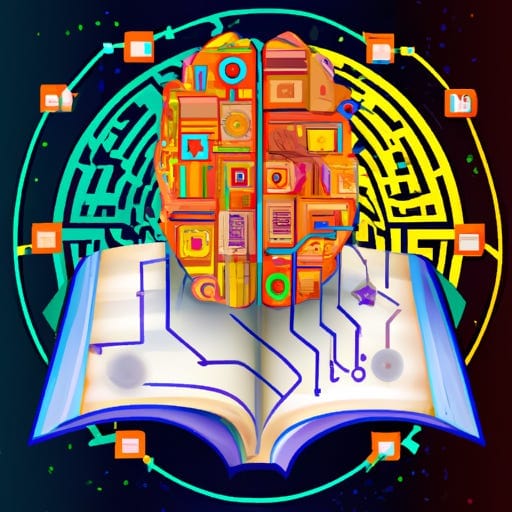Weekly Highlights: To Pause or Not to Pause, Bloomberg's New Language Model and How AI is Changing Software Development
A rundown of three most important developments in AI the week ending 3/31/23

Hi Hitchhikers!
First, a massive welcome to the 500 new subscribers that hitched a ride with us this week!
In this week’s highlights:
- The Great AI Debate: To Pause or Not to Pause?
- Bloomberg’s new large-scale language model for finance.
- How AI is Revolutionizing Software Development.
Before we continue, if you enjoy this newsletter and would like to support me, please share it with a friend and help me get to 5,000 subscribers by June.
1. To Pause or Not to Pause AI?
This week the public discourse around AGI reached a climax when an open letter sponsored by the Future of Life Institute made called for a six-month pause on AI developments.
BREAKING: A petition is circulating to PAUSE all major AI developments.
— Lorenzo Green 〰️ (@mrgreen) 12:35 PM ∙ Mar 29, 2023
e.g. No more ChatGPT upgrades & many others.
Signed by Elon Musk, Steve Wozniak, Stability AI CEO & 1000s of other tech leaders.
Here's the breakdown: 👇
Proponents of the pause, including Elon Musk and Steve Wozniak, cite ethical and safety concerns as reasons to pump the brakes1. But there's a counter-movement, led by voices like the Center for Data Innovation, who argue that now is the time to hit the gas and accelerate AI advancements2.
Old joke about agnostic technologists building artificial super intelligence to find out if there’s a God.
— Elon Musk (@elonmusk) 6:37 AM ∙ Mar 30, 2023
They finally finish & ask the question.
AI replies: “There is now, mfs!!”
Here’s a quick break down of both sides of the debate:
✋🏾The Case for Hitting the Brakes
The argument for pausing AI advancements hinges on three main points:
- The Unknowable: AI models have grown so complex that even their creators struggle to predict their behavior. The potential risks to society and humanity are profound and warrant careful consideration.
- Safety First: The pause would allow the development of shared safety protocols, ensuring future AI systems meet rigorous standards and are deployed responsibly.
- Ethical Dilemmas: The ethical implications of AI are complex and far-reaching. A pause would allow for reflection and input from diverse stakeholders.
🚀 The Case for Hitting the Gas
Proponents of acceleration argue that the benefits of AI are too significant to ignore:
- Transformative Impact: AI has the potential to deliver transformative social and economic benefits, from improving healthcare to combating climate change
- Global Leadership: Pausing AI research could allow other nations to gain a strategic advantage. Continued investment in AI research is vital to maintaining geopolitical influence.
- Untapped Potential: The risk for most people is that AI is not deployed soon enough, leading to missed opportunities to enhance safety, efficiency, and innovation
So, where do we go from here?
Personally, I’m of the view that pausing is not the right move because we’re just delaying the inevitable. At the current rate of progress, a 6 month delay would temporarily slow down progress but is unlikely to have a long term impact. It also unfairly slows down competition, which I think is better for the market overall.
At the same time I do think it’s important for governments to plan for the impending changes that AI will have on our labor market and economy. A topic I discussed with Charlie Newark-French, CEO of Hyperscience, in my last podcast episode3. My view here is that a 6 month delay will only create complacency within government. Acceleration meanwhile will create urgency by making the impact of AI far more obvious.
As the debate unfolds, one thing is clear: Our decisions today are going to shape the AI landscape for years to come.
2. BloombergGPT: A New Frontier for Finance and Vertical AI
In my recent post on Navigating AI4, I talked about opportunity to build verticalized AI applications in regulated industries like finance and healthcare. What I didn’t consider was the opportunity to build verticalized large-scale language models in the same industries. This week we saw a groundbreaking entry in vertical LLMs with BloombergGPT, a 50-billion parameter language model explicitly trained for the financial domain.
BloombergGPT is a new LLM for finance.
— elvis (@omarsar0) 1:00 PM ∙ Mar 31, 2023
It's a 50 billion parameter language model trained on financial data.
Claims the largest domain-specific dataset yet with 363 billion tokens... further augmented with 345 billion tokens from general purpose arxiv.org/abs/2303.17564…… https://t.co/s6AfoEPWCx
BloombergGPT had the potential to transform the fintech landscape, as it outperforms existing models like GPT-3.5 on financial tasks while excelling in general-purpose benchmarks. Imagine a language model that can analyze market trends, provide investment insights, and automate financial reporting.
Why is this a big deal?
BloombergGPT is unique in being the first LLM tailored to the complexities of finance. With a dataset of 363 billion tokens, it is trained on Bloomberg's vast financial data sources and augmented with general-purpose data5. This includes proprietary financial data not available to other research teams like OpenAI.
The implications of this are immense. Based on the research, BloombergGPT is a powerhouse in the realm of financial NLP, performing at the highest level across numerous benchmarks. In some cases, it even rivals much larger models with hundreds of billions of parameters, demonstrating its versatility.
What’s more exciting however is the promise this shows for more verticalized use cases. BloombergGPT is a trailblazer for domain-specific language models. Its success signals the potential for LLMs to be developed for other industries, such as healthcare, law, and retail, where specialized knowledge and domain-specific language are paramount. These verticalized models could unlock new capabilities, offering industry-specific insights and solving complex problems.
As we look ahead, the mixed dataset training approach from BloombergGPT may serve as a blueprint for future LLM development in other verticals. Bloomberg has set the stage for a new era of AI innovation, where language models are not just general-purpose tools but highly specialized assets that can drive meaningful change in specific domains.
The question now is: Who's next? Will more companies follow in Bloomberg's footsteps to create verticalized LLMs for their respective industries?
3. How AI is Revolutionizing Software Development
The future of software development is undergoing a seismic shift, thanks to advances in AI that could render the traditional notion of "perfect code" obsolete. In this new era, LLMs like GPT-4 can write code, debug, and run it autonomously based on our demands.
The implications of this shift are profound. For example, Auto-GPT is a project by an anonymous AI developer which has the ability to "self-heal" code as in the example below:
Massive Update for Auto-GPT: Code Execution! 🤖💻
— Significant Gravitas (@SigGravitas) 3:05 PM ∙ Apr 1, 2023
Auto-GPT is now able to write it's own code using #gpt4 and execute python scripts!
This allows it to recursively debug, develop and self-improve... 🤯 👇
Behind the scenes the tool uses GPT-4 to continuously debug and iterate on code based on the error messages received until the code works. Anyone who has spent a lot of time debugging code knows that this is a tedious process and can often take much longer than writing the code in the first place. With tools like Auto-GPT and the recently announced Github Copilot X, this is going to be a thing of the past.
Another great example of AI in software engineering is Marvin, an AI-powered platform offering developers “AI functions”. Marvin's AI functions allow developers to leverage AI through familiar function calls and data structures without writing source code. Instead the undergoing functionality is carried out by an LLM.
🚨 DON'T PANIC.
— Jeremiah Lowin (@jlowin) 7:10 PM ∙ Mar 29, 2023
👋 We're open-sourcing @AskMarvinAI to make it easy to build AI-powered software!
🪄 Marvin introduces AI Functions: minimalist functions with no source code that can generate typed outputs with AI.
😛 It's like no-code... in your code.
askmarvin.ai
AI Functions require no source code and generate typed outputs with AI. The library follows a "functional prompt engineering approach," allowing developers to use AI with structured inputs and outputs, not just text. The result is a seamless integration of AI with traditional code, enabling the creation of sophisticated AI pipelines. Marvin also includes "bots" that can take instructions and solve complex problems by leveraging plugins or external knowledge.
The implications of this AI-powered revolution extend far beyond just writing and debugging code. We're entering an era where code can operate autonomously, responding to changing conditions and demands without human intervention. Soon you will be able to just describe the application you want to build and AI will code all of it!
As exciting as these developments are, they also raise important ethical considerations. What happens when this self-healing, autonomous code falls into the hands of malicious actors? Could AI be weaponized to carry out cyberattacks or perpetrate other forms of harm? While these concerns are giving us pause (literally), they also open up a world of new possibilities!
That’s a wrap for this week, folks. If you enjoy reading this newsletter and aren’t a subscriber yet, please support me by smashing that subscribe button!
Thanks for reading The Hitchhikers Guide to AI! Subscribe for free to receive new posts and support my work.
Elon Musk and top AI researchers call for pause on ‘giant AI experiments’ - The Verge ↩
The Sky Is Not Falling: Accelerate, Don’t Pause, AI Advancements, Says Center for Data Innovation | ITIF ↩
- Enterprise AI, Augmented Employees, AGI and the Future of Work with Charlie Newark-French, CEO of Hypersciencenull
- Navigating the AI Landscape: Market Trends and Opportunities For StartupsHi Hitchhikers! To the 170+ new subscribers since my last post, welcome to The Hitchhiker’s Guide to AI! I’m so grateful for your support. This week instead of the usual highlights post, I’m going to deep dive into a topic I’ve been thinking about a lot lately:
BloombergGPT: a large language model for finance – Finadium ↩


